
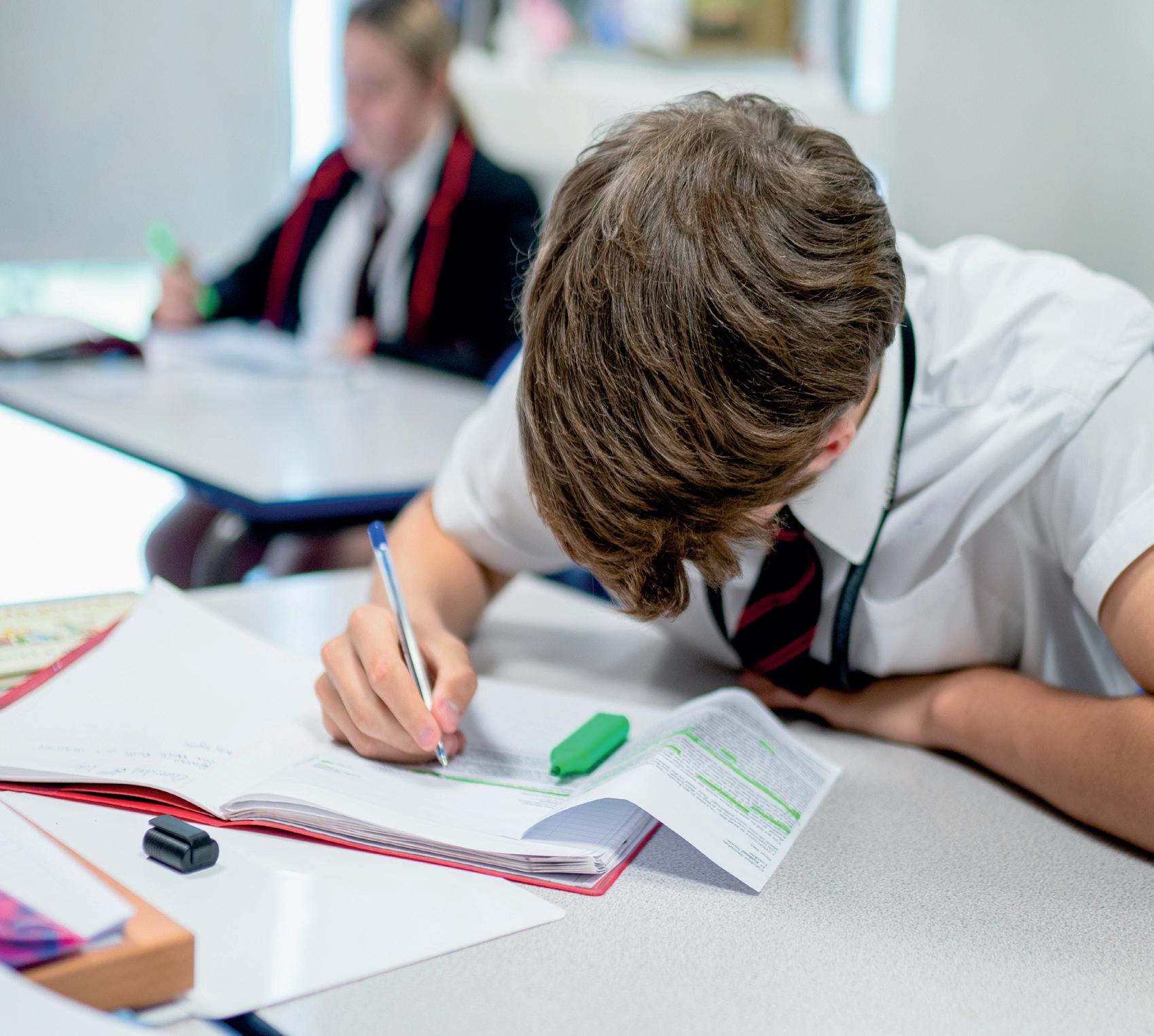



Dear students,
As you approach the next two years of your education, you will be able to make some choices about which courses you wish to pursue to GCSE. This is one of the most important decisions you will make during your time at Birkenhead Park School. The choices you make now start to shape your future opportunities for University and employment.
It is important that you think carefully about your options and talk widely with your family and teachers. The options process presents you with a genuine opportunity to compile a personalised curriculum appropriate to you. In creating the range of optional subjects, we have attempted to create a selection of courses that fulfil their ambitions and interests. Your options alongside core subjects will enable you to follow any future career pathways. This means that you shouldn’t worry too much about whether your options match a potential career choice, plenty of people don’t yet know what career they want to do yet! However, for students that are hoping to become a dentist, doctor or vet – separate science is required and should be chosen for these career paths.
English, mathematics, science, history, geography and MFL form the English Baccalaureate suite of subjects. These are highly regarded subjects when taken together and are a massive acheivement.
Genuine interest and enthusiasm in a subject is always a sound basis from which to start the selection process. The choices are for you and your family to make. We will always be happy to provide you with advice and guidance; but we are insistent that the choice is yours. I do hope you find the information in this booklet helpful. If you need to seek clarification from me or staff in subject departments, please do not hesitate in approaching any of us.
You should be immensely proud of your achievements in your first three years at Birkenhead. I am very confident that you will go on to achieve high levels of success in this very important phase of your studies and we will be here to support you in every way that we can.
Good luck!
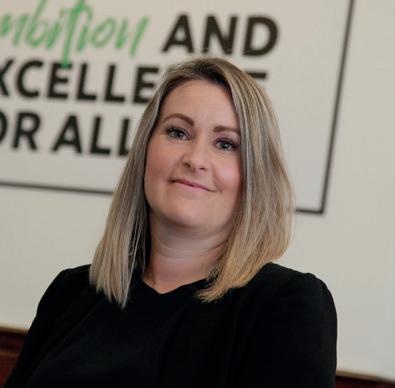
Miss Dawes Assistant Headteacher
Once
If

In deciding which option subjects to pursue to GCSE level, there are many factors to consider, and questions to ask yourself:
Students will continue to take part in PE during their studies. Whilst this will not lead to a qualification, it helps with our students’ overall wellbeing.
You must pick one option from history, geography or MFL. Then you can choose any three other subjects that you wish to study at GCSE from the options list. You will be asked to make two reserve choices.
• Choice One: Pick one of these - history, geography or MFL
• Choice Two:
• Choie Three:
• Choice four: Any from the Options List
• Reserve One:
• Reserve Two: }
It is often the case that the subjects at which students are most successful are also those which they most enjoy. It is very important that you do some research into exactly what each GCSE entails. This booklet should give you some key information in this respect.
Although life is not simply about getting good examination results, it is important that you opt for subjects in which you have a strong chance of doing well. Equally, it is likely that you will enjoy your time at school more if you are studying subjects which you do not find excessively difficult.
For entry to some professions, it is important to have the right academic qualifications. Those wishing to enter disciplines such as medicine or engineering, for example, would be strongly advised to opt for three sciences. However, for entry to many degree courses and professions, it is not a requirement to have studies any particular subjects. The best advice, therefore, is probably to ensure that you make a sensible choice that does not rule out particular careers that you may be considering, but which leaves enough flexibility to allow you to change your mind later.
Many people are on hand to help you decide the best combination of subjects for you. Your form tutor, teachers and parents will all be happy to give advice. You should take the time to seek advice from as wide a range of people as possible and think through all the options. In that way, you maximise the chances of making the best choice.
Assessment
Paper 1: Explorations in Creative Reading and Writing
Written exam: 1 hour 45 minutes
80 marks
50% of GCSE
Paper 2: Writers’ Viewpoints and Perspectives
Written exam: 1 hour 45 mins
80 marks
50% of GCSE
What topics are covered during the course?
Students will draw upon a range of texts as reading stimulus and engage with creative as well as real and relevant contexts. Students will have opportunities to develop higher-order reading and critical thinking skills that encourage genuine enquiry into different topics and themes.
This specification will ensure that students can read fluently and write effectively. Students will be able to demonstrate a confident control of Standard English and write grammatically correct sentences, deploying figurative language and analysing texts.
Students will also present a prepared spoken presentation and listen to and respond appropriately to any questions and feedback.
What skills will I develop?
Students will develop critical and creative thinking, focusing on the vital skills of reading, writing and oracy.
Students learn to analyse and interpret texts, develop persuasive writing abilities, and speak fluently and confidently.
Students prepare for the demands of higher education, equipping them with the ability to articulate thoughts and arguments effectively.
After GCSEs:
A requirement at grade 5 or above is a requirement for many FE courses and Modern Apprenticeships.
A Level English Language/Literature.
Universities:
Degrees in English/English Literature, Law, Media, Business Studies, Journalism, Art History, Teaching English as a Foreign Language.
What careers are linked to this course?
Journalism, Law, Media, Teaching (at home or overseas), Advertising, Design, Marketing, PR, Publishing, Librarianship, Tourism, Museums and Galleries.
Other Information:
There is also a compulsory Speaking and Listening element which does not count towards the overall GCSE English grade but is assessed as pass/merit/distinction. This will take the form of a 5 minute individual presentation.
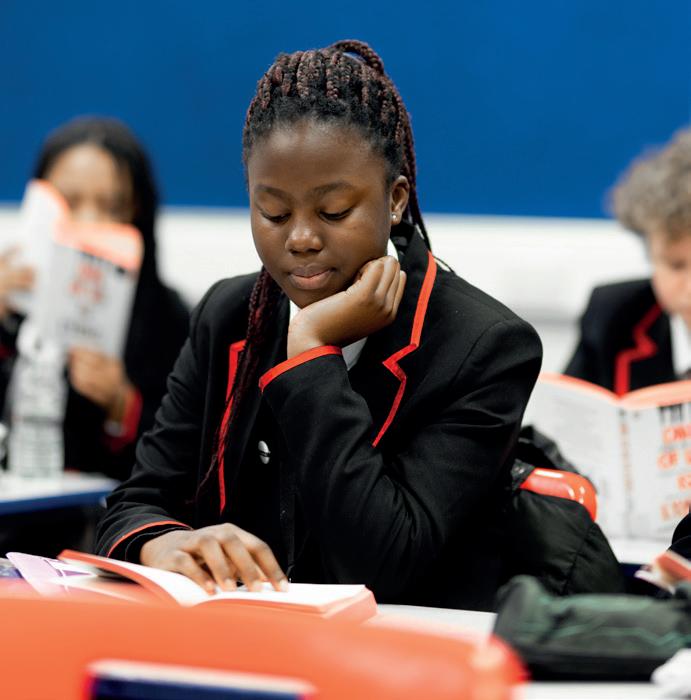
Assessment
Paper 1: Shakespeare and the 19th Century novel
Written exam: 1 hour 45 minutes
64 marks
40% of GCSE
Paper 2: Modern texts and poetry
Written exam: 2 hour 15 mins
96 marks
60% of GCSE
What topics are covered during the course?
Students will study a range of literary texts including: Macbeth, A Christmas Carol and An Inspector Calls.
They will also study an anthology of poetry from the Love and Relationships cluster and a collection of unseen poetry.
Students will foster a deep appreciation for reading and sharpen their analytical abilities.
Students will learn to dissect texts, identifying and examining key themes and evaluating the author’s language and how ideas are conveyed.
Students will understand the historical and cultural context in which a text was written and explore how literature connects readers with broader societal truths and ideas.
Students will develop critical thinking about how literature mirrors and influences society.
After GCSEs:
A requirement at grade 5 or above is a requirement for many FE courses and Modern Apprenticeships.
A Level English Language/Literature.
Universities:
Degrees in English/English Literature, Law, Media, Business Studies, Journalism, Art History, Teaching English as a Foreign Language.
What careers are linked to this course?
Journalism, Law, Media, Teaching (at home or overseas), Advertising, Design, Marketing, PR, Publishing, Librarianship, Tourism, Museums and Galleries.
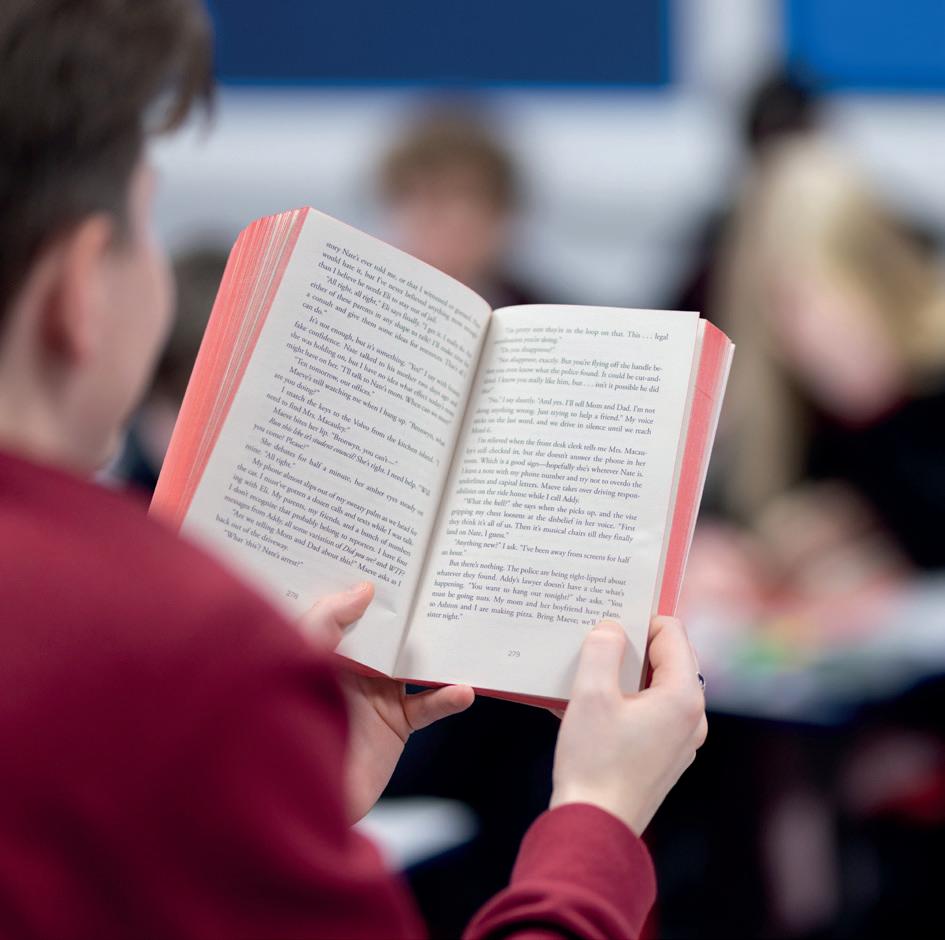
Assessment
1 x 1 hour 30 minute Non Calculator Paper
2 x 1 hour 30 minute Calculator Papers
What topics are covered during the course?
Statistics and Number which include: the number system, fractions, decimals, percentages, ratio, proportion, the language of algebra, sequences, functions, graphs, the handling data cycle, data collection, data presentation and analysis, data interpretation and probability.
Number and Algebra which includes: the number system, fractions, decimals, percentages, ratio, proportion, the language of algebra, expressions and equations, sequences, functions and graphs.
Geometry and Algebra which includes: the number system, fractions, decimals, percentages, ratio, proportion, the language of algebra, expressions and equations, sequences, functions, graphs, properties of angles, shapes, geometrical reasoning and calculation, measures and construction, mensuration and vectors.
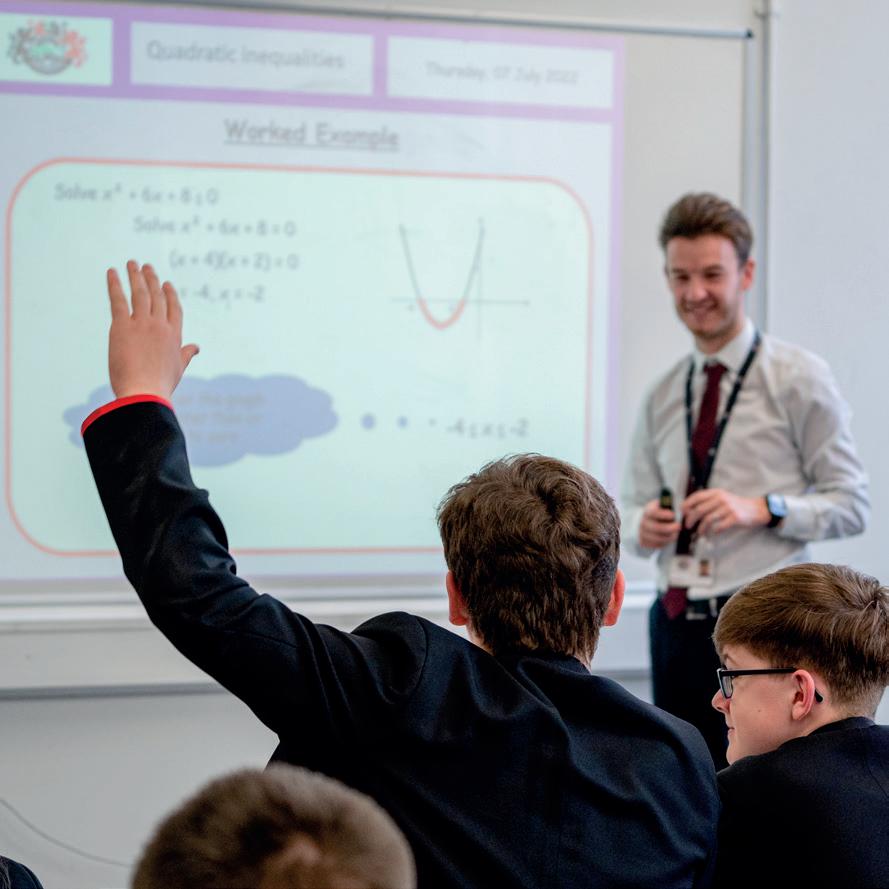
Embedded within the curriculum there is an emphasis on Mathematical Reasoning and Problem Solving which is delivered through the above topic areas.
The functional elements of Mathematics are also embedded, providing learners with the skills and abilities needed to take an active and responsible role in their communities, everyday life and workplace.
The functional elements focus on the following key process:
• Representing: this is about understanding ‘real world’ problems and selecting the mathematics to solve them.
• Analysing: this is about applying a range of mathematics within realistic contexts.
• Interpreting: this is about communicating and justifying solutions and linking solutions back to the original problem.
After GCSEs:
GCSE Maths will be required for access to many A Level courses such as Sciences, Business and Finance.
Universities:
Access to most undergraduate courses require at least grade 5 in GCSE Maths.
What careers are linked to this course?
Engineering, Medicine, Scientist, Business, Banking, Teaching, Electrician, Plumber, Retail, Catering.
There are six papers: two Biology, two Chemistry and two Physics. Each of the papers will assess knowledge and understanding from distinct topic areas. Papers are 1hr 10 mins.
Students will undertake all 6 exam papers at either foundation tier (grades 1-5) or higher tier (grades 4-9). At the end of the course, students receive two GCSEs for combined science based on their performance across all 6 exam papers.
What topics are covered during the course?
Key concepts in Biology:
• Cells and control
• Genetics
• Natural Selection and Genetic Modification
• Health, disease and the development of medicines
• Plant structures and their functions
• Animal coordination, control and homeostasis
• Exchange and transport in animals
• Ecosystems and material cycles
Key concepts in Chemistry:
• States of matter and mixtures
• Chemical changes
• Extracting metals and equilibria
• Groups in the periodic table
• Rates of reaction and energy changes
• Fuels and Earth science
Key concepts in Physics:
• Motion and forces
• Conservation of energy
• Waves
• Light and the Electromagnetic spectrum
• Radioactivity
• Forces doing work
• Forces and their effects
• Electricity and circuits
• Magnetism and the motor effect
• Electromagnetic induction
• The particle model
• Forces and matter
What skills will I develop?
• Investigative skills
• Practical skills
• Mathematical skills
• How science works skills
After GCSEs:
• A Level
• Level 3 BTEC
• All areas of further scientific study
• Apprenticeships
Universities:
A variety of under graduate and post graduate Science Degrees.
What careers are linked to this course?
Environmental scientist, health profession, optometrist, pharmacist, geoscientist, chemical technician, science teacher, mechanical engineer, dental hygienist, engineer, agricultural roles.
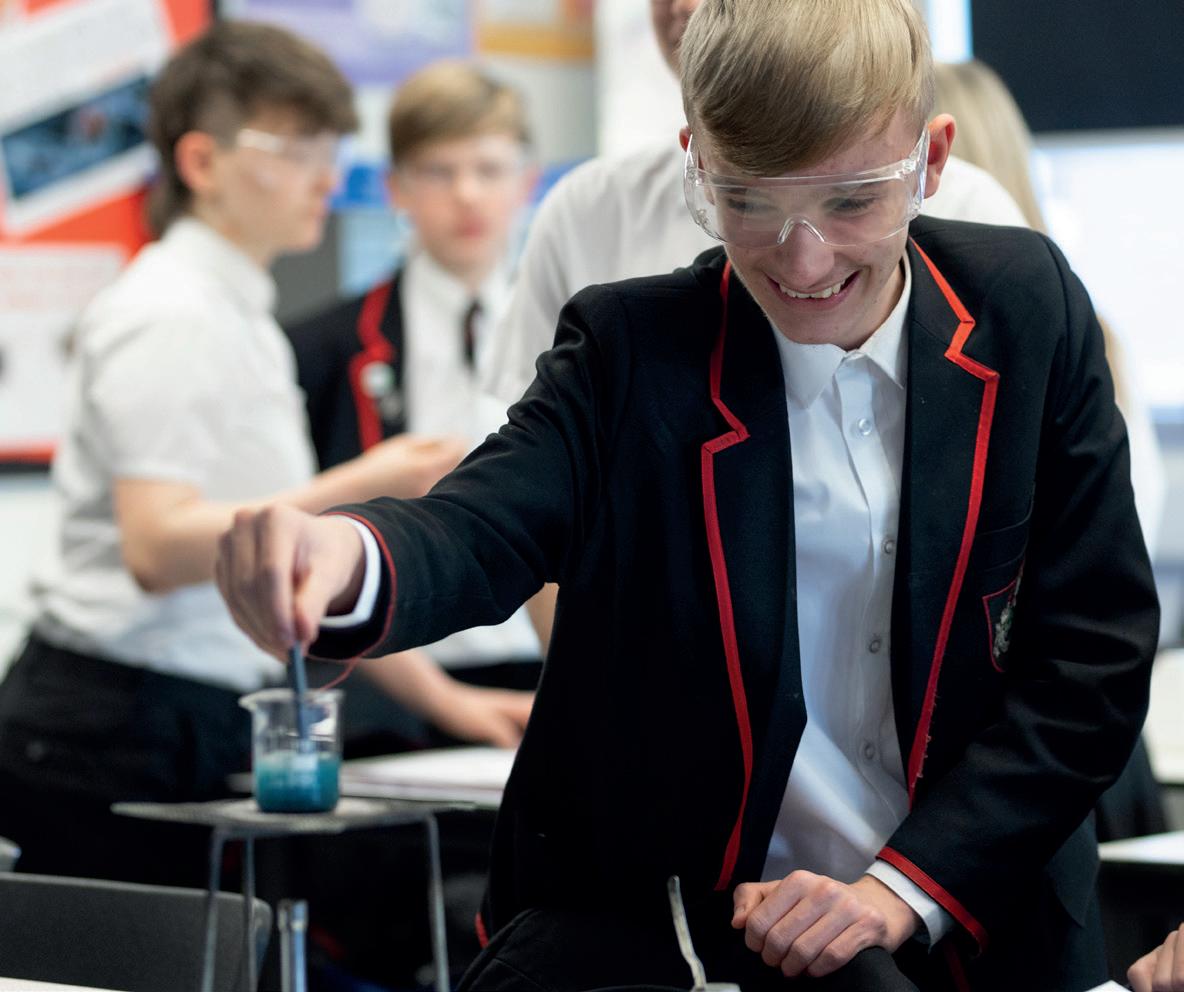
Students will sit 2 exam papers (1hr 45mins) at either foundation tier (grades 1-5) or higher tier (grades 4-9). At the end of the course, students receive 1 GCSE in Biology based on their performance across both exam papers.
What topics are covered during the course?
Biology: engaging course, many concepts taught through practicals.
• Cells and control
• Genetics
• Natural selection and genetic modification
• Health, disease and the development of medicines
• Plant structures and their functions
• Animal coordination, control and homeostasis
• Exchange and transport in animals
• Ecosystems and material cycles.
What skills will I develop?
• Investigative skills
• Practical skills
• How science works skills
• Applications of science
• Science in the world of work skills
After GCSEs:
• A Level
• Level 3 BTEC
• All areas of further scientific study
• Apprenticeships
Universities:
All science degrees including medicine.
What careers are linked to this course?
Doctor, chemical engineer, petroleum engineer, energy engineer, Dentist, Neurologist, biochemist, marine biologist, veterinarian, engineer, zoologist.
Other Information:
This course is suitable for students that have a real interest in science and feel they may wish to study it further post 16.
WITH BIOLOGY & PHYSICS
Assessment
Students will sit 2 exam papers (1hr 45mins) at either foundation tier (grades 1-5) or higher tier (grades 4-9). At the end of the course, students receive 1 GCSE in Chemistry based on their performance across both exam papers.
What topics are covered during the course?
Chemistry: bring chemistry to life with clear content, minimal context and practical’s at its heart.
• States of matter and mixtures
• Chemical changes
• Extracting metals and equilibria
• Groups in the periodic table
• Rates of reaction and energy changes
• Fuels and earth science.
What skills will I develop?
• Investigative skills
• Practical skills
• How science works skills
• Applications of science
• Science in the world of work skills
After GCSEs:
• A Level
• Level 3 BTEC
• All areas of further scientific study
• Apprenticeships
Universities:
All science degrees including medicine.
What careers are linked to this course?
Doctor, chemical engineer, petroleum engineer, energy engineer, Dentist, Neurologist, biochemist, marine biologist, veterinarian, engineer, zoologist.
Other Information:
This course is suitable for students that have a real interest in science and feel they may wish to study it further post 16. Level:
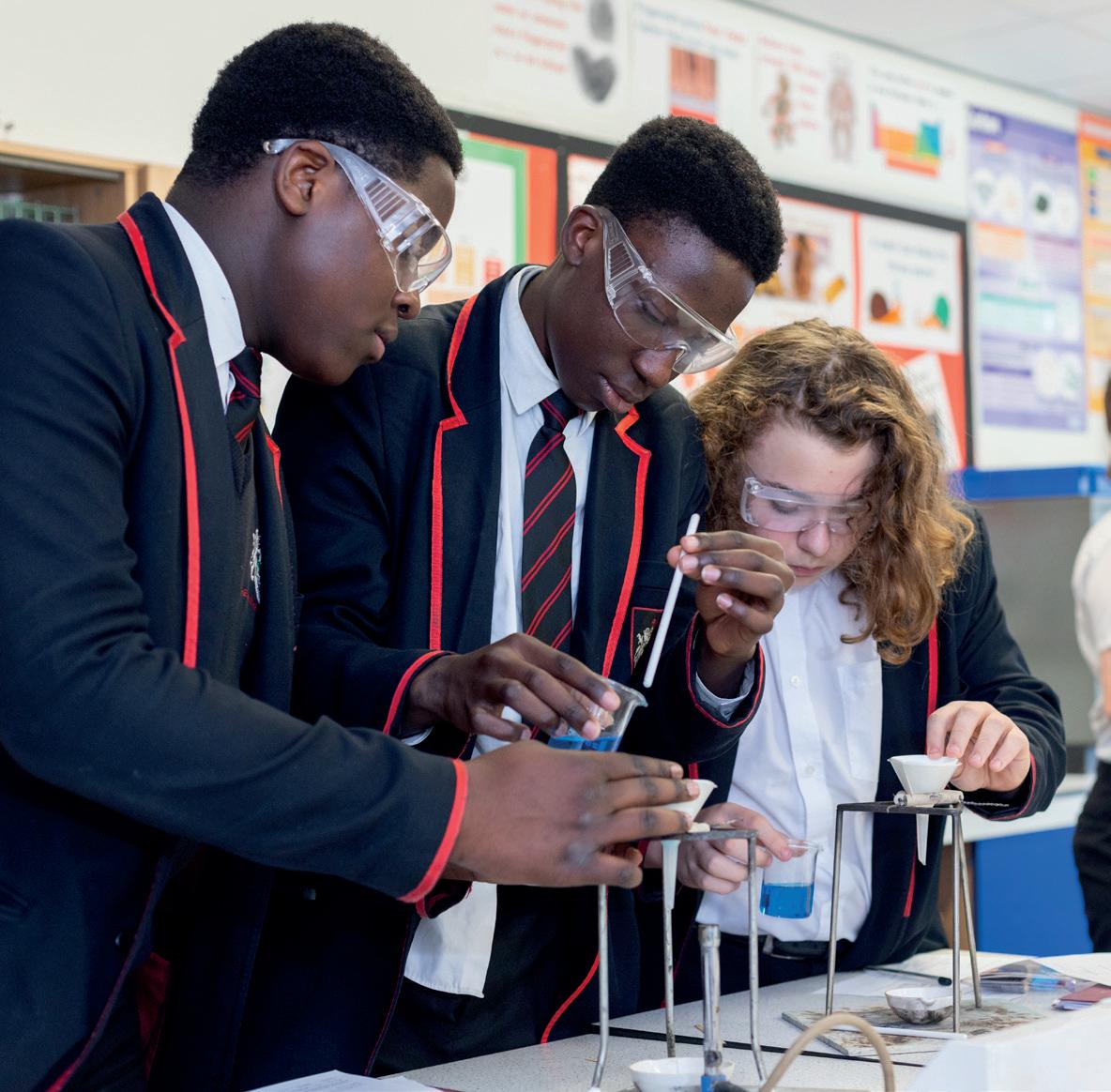
Assessment
Students will sit 2 exam papers (1hr 45mins) at either foundation tier (grades 1-5) or higher tier (grades 4-9). At the end of the course, students receive 1 GCSE in Physics based on their performance across both exam papers.
What topics are covered during the course?
Physics: from the depths of space to the forces on Earth: discover our exciting new physics specification.
• Motion and forces
• Conservation of energy
• Waves
• Light and the electromagnetic Spectrum
• Radioactivity
• Astronomy
• Forces doing work
• Forces and their effects
• Electricity and circuits
• Static electricity
• Magnetism and the motor effect
• Electromagnetic induction
• The particle model
• Forces and matter
What skills will I develop?
• Investigative skills
• Practical skills
• How science works skills
• Applications of science
• Science in the world of work skills
After GCSEs:
• A Level
• Level 3 BTEC
• All areas of further scientific study
• Apprenticeships
Universities:
All science degrees including medicine.
What careers are linked to this course?
Doctor, chemical engineer, petroleum engineer, energy engineer, Dentist, Neurologist, biochemist, marine biologist, veterinarian, engineer, zoologist.
Other Information:
This course is suitable for students that have a real interest in science and feel they may wish to study it further post 16.
Paper 1: Listening (25%) Written exam: 35 minutes (Foundation tier), 45 minutes (Higher tier) 40 marks (Foundation tier), 50 marks (Higher tier) Section A – listening comprehension questions in English; Section B – dictation
Paper 2: Speaking (25%) NEA; tasks include: a role-play, a reading aloud task and short conversation, a Photo Card discussion and unprepared conversation.
Paper 3: Reading (25%) Written exam: 45 minutes (Foundation tier), 1 hour (Higher tier); Section A – reading comprehension questions in English; Section B – translation from French into English
Paper 4: Writing (25%) Written exam: 1 hour 10 minutes (Foundation tier), 1 hour 15 minutes (Higher tier) Writing tasks including several pieces of writing, a grammar exercise and a translation.
What topics are covered during the course?
Theme 1: People and lifestyle
Topic 1: Identity and relationships with others
Topic 2: Healthy living and lifestyle
Topic 3: Education and work
Theme 2: Popular culture
Topic 1: Free-time activities
Topic 2: Customs, festivals and celebrations
Topic 3: Celebrity culture
Theme 3: Communication and the world around us
Topic 1: Travel and tourism, including places of interest
Topic 2: Media and technology
Topic 3: The environment and where people live
The GCSE specification in French will enable learners to:
• offers students the opportunity to develop their French language skills to their full potential, equipping them with knowledge and confidence they can use both in and outside of the classroom.
• build their cultural knowledge alongside their language skills.
• draw together their knowledge, skills and understanding from across the full course of study
After GCSEs: A Level French
Universities:
The study of French can lead to a vast amount of degrees including French Studies / European Studies / English and French Law / French and History / French and Business administration / Film Studies and French / Computing and French / Criminology with Foreign Languages and many more… What careers are linked to this course?
The study of GCSE French is naturally an integral part of the European dimension, equipping the workforce of the future with skills appropriate to the global economy. The list of careers available thanks to languages is endless, but here are a few: teaching, translating, interpreting, finance, catering, law, sales and marketing, tourism, leisure, international organisations, teaching English as a Foreign Language, etc…
The study of GCSE French is naturally an integral part of the European dimension, equipping the workforce of the future with skills appropriate to the global economy. The list of careers available thanks to languages is endless, but here are a few: teaching, translating, interpreting, finance, catering, law, sales and marketing, tourism, leisure, international organisations, teaching English as a Foreign Language, etc…differences in the two cultures.
Assessment
Paper 1: Listening (25%) Written exam: 35 minutes (Foundation tier), 45 minutes (Higher tier) 40 marks (Foundation tier), 50 marks (Higher tier) Section A – listening comprehension questions in English; Section B – dictation
Paper 2: Speaking (25%) NEA; tasks include: a role-play, a reading aloud task and short conversation, a Photo Card discussion and unprepared conversation.
Paper 3: Reading (25%) Written exam: 45 minutes (Foundation tier), 1 hour (Higher tier); Section A – reading comprehension questions in English; Section B – translation from French into English
Paper 4: Writing (25%) Written exam: 1 hour 10 minutes (Foundation tier), 1 hour 15 minutes (Higher tier) Writing tasks including several pieces of writing, a grammar exercise and a translation.
What topics are covered during the course?
Theme 1: People and lifestyle
Topic 1: Identity and relationships with others
Topic 2: Healthy living and lifestyle
Topic 3: Education and work
Theme 2: Popular culture
Topic 1: Free-time activities
Topic 2: Customs, festivals and celebrations
Topic 3: Celebrity culture
Theme 3: Communication and the world around us
Topic 1: Travel and tourism, including places of interest
Topic 2: Media and technology
Topic 3: The environment and where people live
PLEASE BE AWARE THAT THIS COURSE IS ONLY AVAILABLE TO STUDENTS WHO HAVE OPTED TO DO GCSE SPANISH. This option cannot be chosen on its own.
skills will I develop?
The GCSE specification in French will enable learners to:
• offers students the opportunity to develop their French language skills to their full potential, equipping them with knowledge and confidence they can use both in and outside of the classroom.
• build their cultural knowledge alongside their language skills.
• draw together their knowledge, skills and understanding from across the full course of study
After GCSEs: A Level French Universities:
The study of French can lead to a vast amount of degrees including French Studies / European Studies / English and French Law / French and History / French and Business administration / Film Studies and French / Computing and French / Criminology with Foreign Languages and many more…
What careers are linked to this course?
The study of GCSE French is naturally an integral part of the European dimension, equipping the workforce of the future with skills appropriate to the global economy. The list of careers available thanks to languages is endless, but here are a few: teaching, translating, interpreting, finance, catering, law, sales and marketing, tourism, leisure, international organisations, teaching English as a Foreign Language, etc…
Other Information
The study of GCSE French is naturally an integral part of the European dimension, equipping the workforce of the future with skills appropriate to the global economy. The list of careers available thanks to languages is endless, but here are a few: teaching, translating, interpreting, finance, catering, law, sales and marketing, tourism, leisure, international organisations, teaching English as a Foreign Language, etc…differences in the two cultures.
Assessment
3 x 1hr 30mins examinations (100% combined).
There is no coursework or controlled assessment.
What topics are covered during the course?
Paper 1 - Living with the physical environment. Come and study the exciting and fascinating way the natural world works.
• How earthquakes and volcanoes are caused?
• What are the effects of an earthquake?
• What is climate change and is it man made or natural?
• How can deserts be hot and cold?
• How do we adapt to live with the extreme weather the world experiences?
Paper 2 - Challenges in the human environment.
Think about:
• Why access to water will become a source of conflict?
• Should the 20% of people in the world who own 80% of the world’s money help poorer countries to develop?
• Why do people live in homes made out of paint cans?
• How has the way the UK earns money changed in the last 100% how might it be different in the years to come?
Paper 3
An adventure to Hilbre Island awaits you! Take part in a day long fieldwork trip that will open your eyes to how the world works right on your doorstep. As well as a trip to Liverpool, it will enable you to put geography into practice.
The pre-release allows us to explore and investigate a current geographical topic.
During this course students will gain a wide range of geographical skills and increase their knowledge and understanding of key concepts like; place, space, scale, interdependence, environmental interaction, physical and human processes and cultural understanding and diversity. Students will be given the opportunity to develop opinions, assess the reliability of evidence and communicate ideas and information in a variety of formats.
Geography at GCSE is highly valued by employers, colleges and universities. It can lead to a wide range of post 16 courses including A-Levels, Level 3 Vocational Courses and apprenticeships.
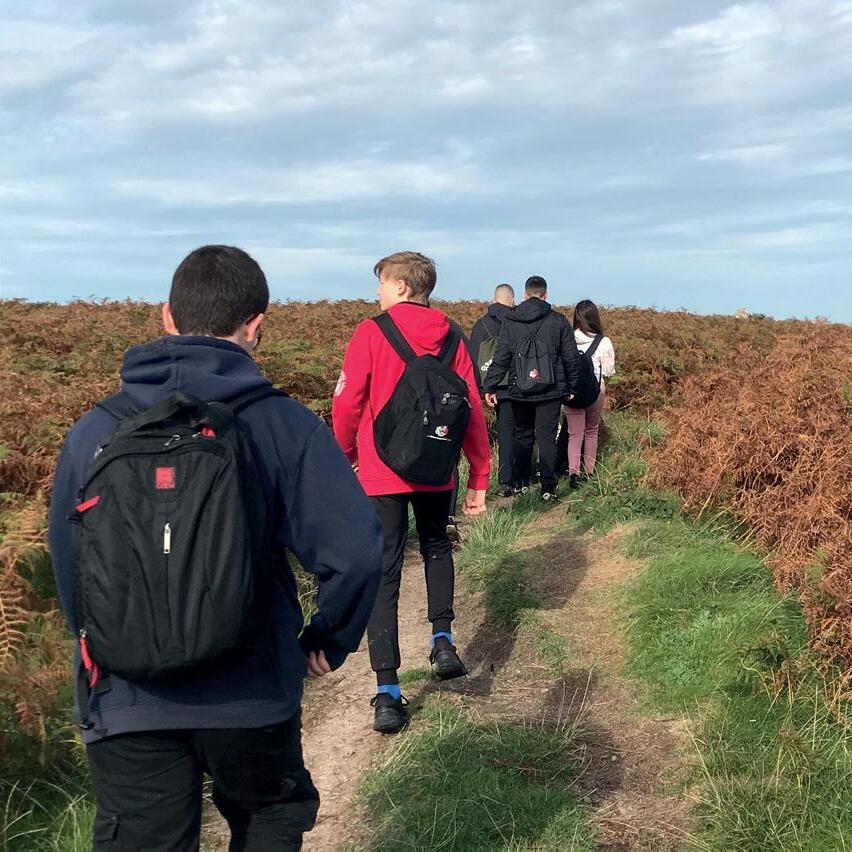
Geography leads to the application of student’s knowledge as it covers a wide range of topics studied in Science, History, English and SMSC.
What careers are linked to this course?
This course is valuable to those students who wish to pursue careers in, amongst others: Law, Medicine, Armed Forces, Rescue Services, Teaching, Estate or Travel Agents, Architecture, Surveyor, Accountancy, Town Planning and careers which involve travelling.
Assessment
Paper 1- external exam based on Crime and Punishment from 1000-present. (30%).
Paper 2- external exam based on Henry VIII and his ministers and Superpower Relations 1941-91 (40%).
Paper 3- external exam based on The USA, 195475; conflict at home and abroad (30%).
What topics are covered during the course?
The course is made up of 4 EXCITING parts, students will study:
Crime and Punishment
• How were criminals treated in Medieval England?
• Why were ‘witch hunts’ carried out?
• Who was Jack the Ripper and why didn’t ‘Hdivision’ catch him?
Henry VIII and his ministers
• Why did Henry have six wives?
• Does Henry deserve the title ‘star or monster’?
Superpower Relations and the Cold War 194191
• How close did the world come to nuclear war in 1962?
The USA, 1954-75 conflict at home and abroad
• Did US soldiers deserve being called ‘baby killers’?
• Why was a 14 year old Black American murdered in the 1950’s and his killers let off?
What skills will I develop?
Students will develop many skills that a traditional based subject has to offer. Students will require an ability to recall, select and communicate their knowledge and understanding of history. They will also develop an understanding of key concepts such as causation, consequence, continuity and change between different periods. Students will develop an enquiring mind and an ability to work independently to present information. Many of these skills are directly linked to further education and highly desirable for future employees.
After GCSEs:
History at GCSE is highly valued by employers as evidence of high levels of literacy and enhanced critical thinking skills. Being able to think independently, discuss and explain will set you up for life!
Universities:
History broadens students’ choices if entering higher education and as a challenging and traditional subject is highly valued.
What careers are linked to this course?
History is a well respected qualification in careers such as Law, Accountancy, Journalism, Travel & Tourism, the Armed Services, Education and Social Services. It is valued by business leaders as a subject that enables prospective employees to think quickly and make clear, decisive decisions based on evidence.
Assessment
60% Coursework, which is internally set.
40% externally set task.
What topics are covered during the course?
Component 1 – Portfolio of Work (coursework). Work will be selected from 3 major projects.
Component 2 – Externally set task. Students choose a starting point to respond to and develop ideas for this task. Preparation time is given and they then have a 10 hour period to complete a final piece of work. This will begin in the January of Year 11.
What skills will I develop?
Students will develop their skills in a range of areas including:
• Fine Art
• 3D Art
• Textiles
All students will develop an understanding of the art work of artists, designs and art from other cultures.
After GCSEs:
A Level
Level 3 BTEC which is A Level equivalent.
Universities:
Foundation/BTEC/Degree level in Art & Design areas.
For example – Fine Art, Art illustration etc.
What careers are linked to this course?
Any number of careers including Teaching, Illustration, ICT Design, Architecture, Landscape Design, Audio/Visual Technology, Museums, Art Galleries assistant, Fine Artist, Fashion/ Textile Designer, Jewellery Maker and many more.
Other Information
This course offers students vocational learning and prepares students for post 16 education and beyond.
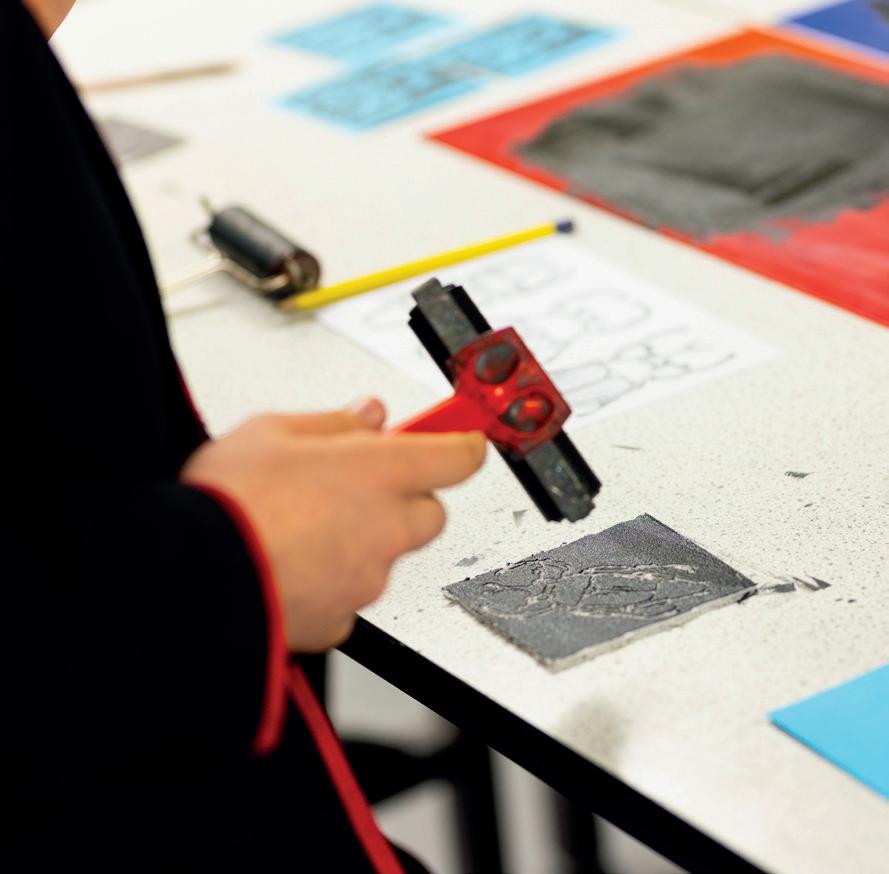
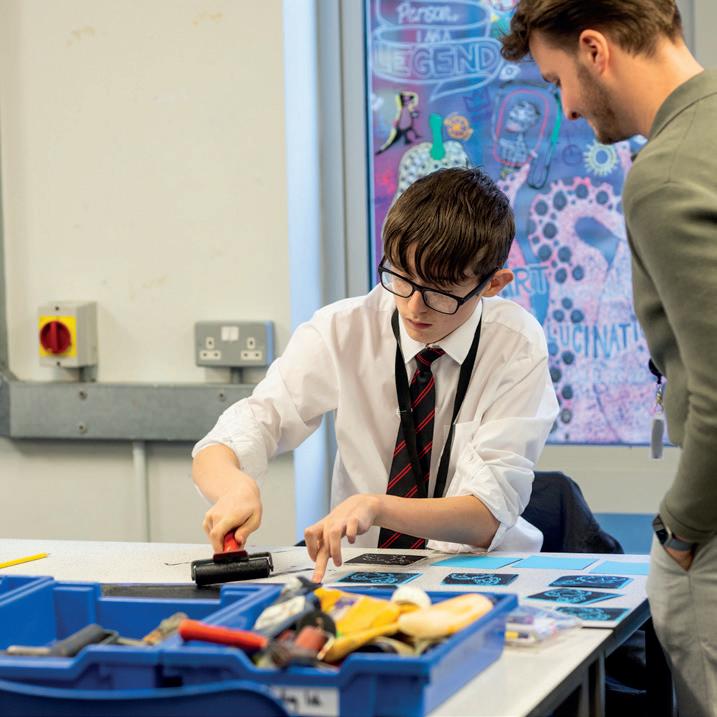
Assessment
Component 1 - 30% internally assessed
Component 2 – 30% internally assessed
Component 3 – 40% externally assessed
What topics are covered during the course?
1. Component 1 – Exploring the Performing Arts - Students will develop their understanding of the performing arts by exploring practitioners’ work in dance and the processes used to create a range of different performances. Students will complete a coursework log book and promotional materials booklet for this component.
2. Component 2 – Developing Skills and Techniques in the Performing ArtsStudents will develop their dance skills through rehearsal and performance. Students will have the option to perform in groups or on their own for their assessed performance work. Students are expected to completed a milestone rehearsal log book for this component.
3. Component 3 – Responding to a Brief (externally set task) - Students will work as part of a group to apply their performance and choreography skills to create a workshop performance in response to a brief and stimulus.
What skills will I develop?
• Creativity
• Decision Making
• Self Awareness
• Confidence
Further educational pathways: A Level
Level 3 BTEC which is A Level Equivalent
Higher Educational Pathways
Foundation/BTEC/Degree Level in Dance/ Performing Arts
Eg. Dance or Musical Theatre
What careers are linked to this course?
Jobs directly related to the study of Performing Arts include, among many others: actor, community arts worker, dancer, drama therapist, theatre director, broadcast presenter, teacher, scriptwriter and theatre stage management.
Assessment
40% Practical exam
60% Coursework
What topics are covered during the course?
The course is made up of three components: two that are internally assessed and one that’s externally assessed.
1. Exploring User Interface Design Principles and Project Planning Techniques | internally assessed assignment(s) | 30% of the total course.
2. Collecting, Presenting and Interpreting Data | internally assessed assignment(s) | 30% of the total course.
3. Effective Digital Working Practices | Externally assessed exam | 40% of the total course.
What skills will I develop?
• Skills needed for employment.
• Gaining practical experience and competence with contemporary technologies.
• Increasing the capacity to transfer knowledge and skills between contexts.
• Developing practical skills in creativity and problem solving.
• Developing an understanding of the social and commercial impact of IT.
After GCSEs:
A Levels as preparation for entry to higher education in a range of subjects
The study of a vocational qualification at Level 3, such as a BTEC National in IT, which prepares learners to enter employment or apprenticeships, or to move on to higher education by studying a degree in the digital sector.
What careers are linked to this course?
Data Analyst, Software Developer, Junior Designer, Database administrator, Software Developer ,Web Designer, Software Engineer, Web Developer and Business Analyst.
All career paths within the ICT industry, importantly most courses and jobs today rely on you being ICT literate with 92% of jobs advertised requiring IT user skills.
The BTEC Tech Award is a practical introduction to life and work in the Digital Information Technology sector, so students can develop their understanding of the sector and see whether it’s an industry they’d like to be in. BTEC Tech Awards focus on building skills which will give your students the confidence to progress in whatever path they choose.
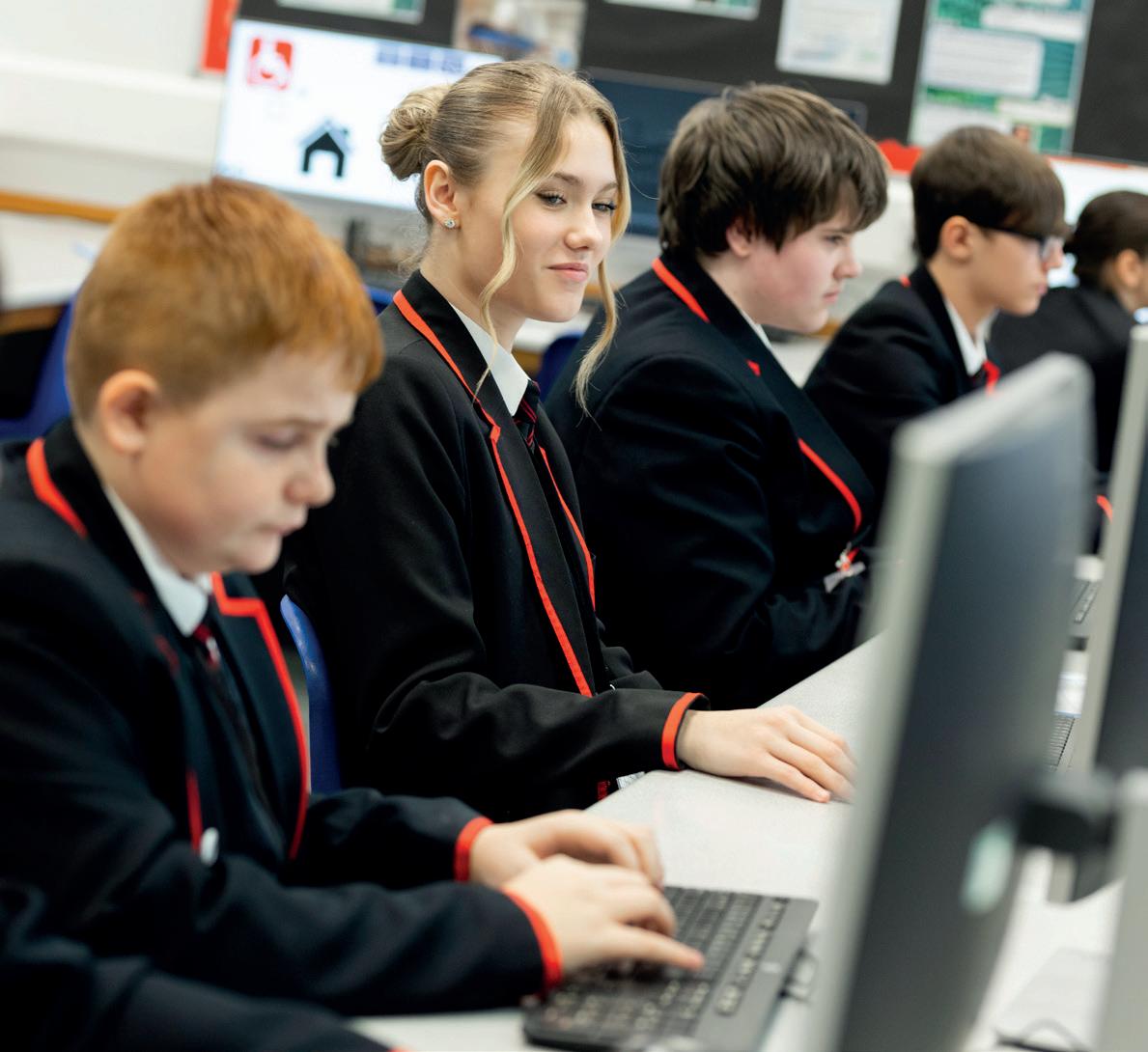
Assessment
Internal Assessment 60%
External Assessment 40%
The subject content for GCSE Drama is divided into three components:
Texts in practice - 20%: Students will create a performance of 2 extracts from the same play. This will be performed for a visiting examiner.
Devising Theatre - 40%: Students will be presented with a range of stimuli and are required to create a piece of original theatre by working in small groups. They will present their finished outcome.
This is supported by a piece of written coursework that follows the process from the ideas stage to the final production.
Understanding theatre - 40%: Students will sit a written exam at the end of Year 11.
The focus of the exam will be Blood Brothers and a live theatre review.

The GCSE qualification that will help you if you are interested in future employment in the Performing Arts or to progress on to a higher level qualification. This course will help you to develop transferable skills such as; selfconfidence, communication, teamwork, critical thinking and building on your imagination, independent study. The course enables students to study a variety of specialisms including Acting, Lighting, Sound, Costume and Set Design.
The course will offer you the opportunity to work with Acting and Directing Professionals both in school and outside.
Trips to the theatre are an important part of the course, which students will be expected to attend.
After GCSEs:
BTEC Diploma Level 3 Higher Education Pathways Level 3 BTEC, A Levels, HNDs, Degrees.
Actor, Singer, Dancer, Musician, Theatre Manager, Funding Officer, Box Office Staff, Front-of-House, Marketing Officer Production Manager, Technical Director, Stage Manager, Set Designer, Lighting Operator, Sound Engineer, Wardrobe Manager, Scenery Constructor, Theatre Outreach Worker, Director, Drama Youth Worker.
This course enable students to study performing arts at a higher level, A Level or BTEC and will prepare students for a career in the performing arts. This course offers both the practical and theoretical elements of Drama and Design. It is compulsory for students to fully participate in both elements At the Birkenhead Park School we have a partnership with LIPA and the opportunity for all students studying drama in Years 10 and 11 to join their outreach theatre provision.
Component 1 and 2: 70% of total grade
Exam-based. Students study the production (e.g. direction, editing, cinematography), narrative, context and criticism of US, UK and global film during a range of eras, as well as developments in film technology.
Component 3: 30% of total grade Coursework element internally assessed, whereby students produce either:
- a filmed extract from a genre film* OR
- a written screenplay extract (800-1000 words)
Both options include a written evaluative analysis (750-850 words) as part of the production.
The course is divided into three components: Components 1 and 2 focus on understanding film from different eras and cultures. Students will learn to analyse and evaluate films using a range of critical and theoretical approaches. Topics covered include film language, representation, genre, narrative, and the historical and cultural contexts in which films are made.
In Component 3, students will have the opportunity to develop their own film production skills, by making short films and writing screenplays. This component will also cover the practical skills and knowledge required to make films, such as cinematography, sound and editing, as well as scriptwriting, production design and animation.
Throughout the course, students will be assessed through a combination of written exams and practical coursework.
Film Studies offers students the opportunity to develop their critical and analytical skills, as well as their understanding of the technical and creative aspects of film production.
A GCSE in Film Studies will enable students to go onto a Level 3 qualification post 16.
What careers are linked to this course?
Any number of careers including teaching, Filmmaking (Directing, Cinematography, Editing, & more) Creative (Writing, Special Effects, Art Direction, & more) Performing (Acting, Stunts, Choreography, & more) Business (Producing, Casting, Talent Management.)
The Film Studies course is suitable for students who have an interest in film and media, and are looking for an engaging and challenging course that will help to develop their critical and analytical skills as well as their understanding of the technical and creative aspects of film production.
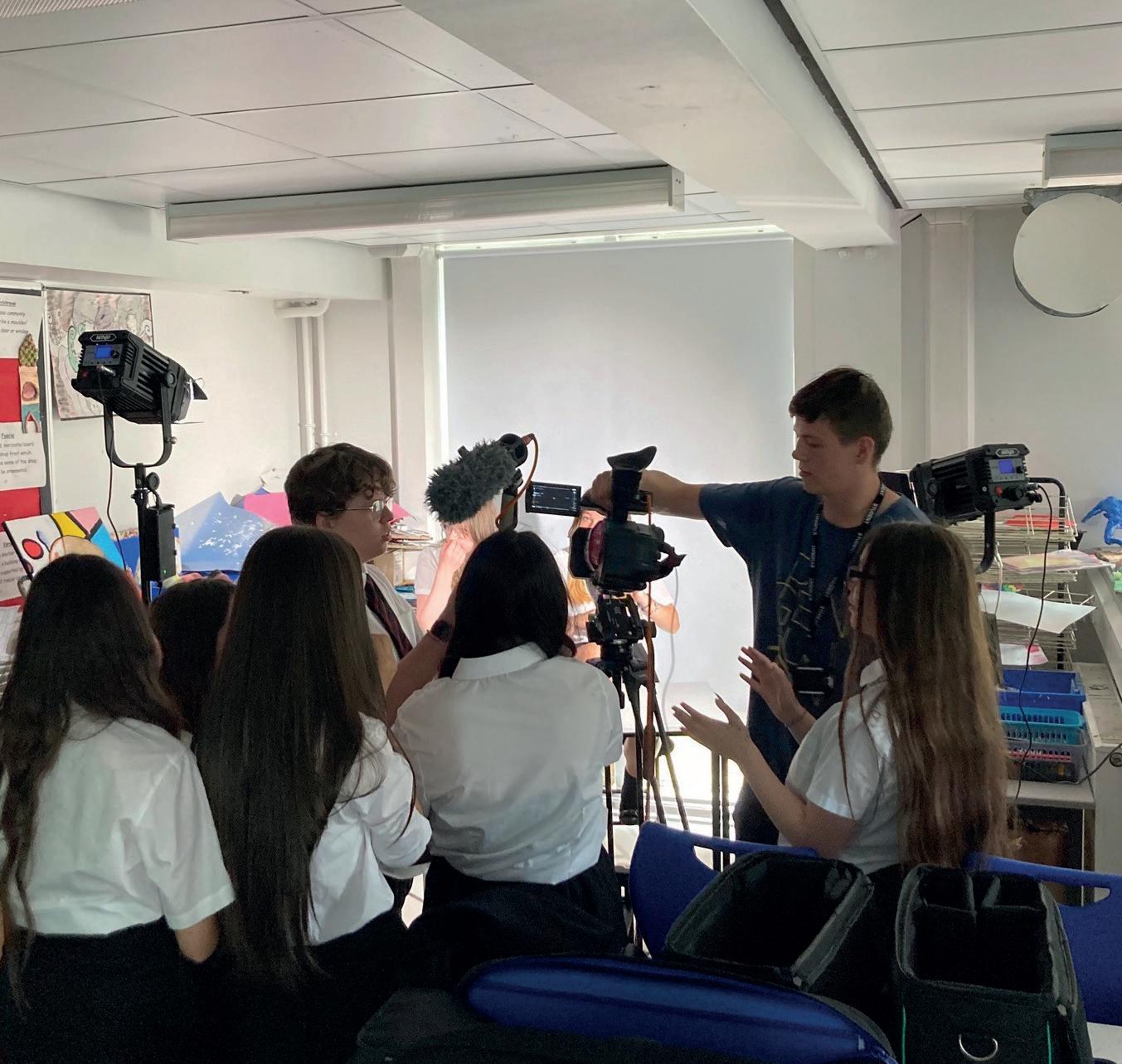
Level: BTEC Level 2 (Equivalent to 1 GCSE)
Exam Board: Pearson Edexcel
Assessment
40% Practical exam
60% Coursework
What topics are covered during the course?
• The course is made up of three components: two components are internally assessed and one is externally assessed.
• Exploring music products and stylesInternally assessed assignment(s) - 30% of the total course.
• Music skills development – Internally assessed assignment(s) - 30% of the total course.
• Responding to a commercial music brief –Externally assessed exam - 40% of the total course.
What skills will I develop?
The Music qualification provides education and training for musicians and music technicians. It gives opportunities for students to gain industry-standard skills in solo performance and music technology that are both vocational and invaluable in the work place. This course also enables learners to develop a range of techniques, personal skills and attributes essential for successful performance in working life.
After GCSEs:
The Music qualification can lead on to the Level 3 BTEC Certificate or equivalents. This qualification would prepare learners for the Level 3 Music and Performing Arts BTECs that are the equivalent to A Level qualifications. These are run at Birkenhead Sixth Form College and also at Wirral Met.
The route after the BTEC Level 3 Diploma would be more specialised courses or Degrees in Music Technology or Performance such as those available at LIPA.
What careers are linked to this course?
All career paths within the music industry including Sound Engineer, Performing Musician, Vocalist, DJ, and even into Music journalism.
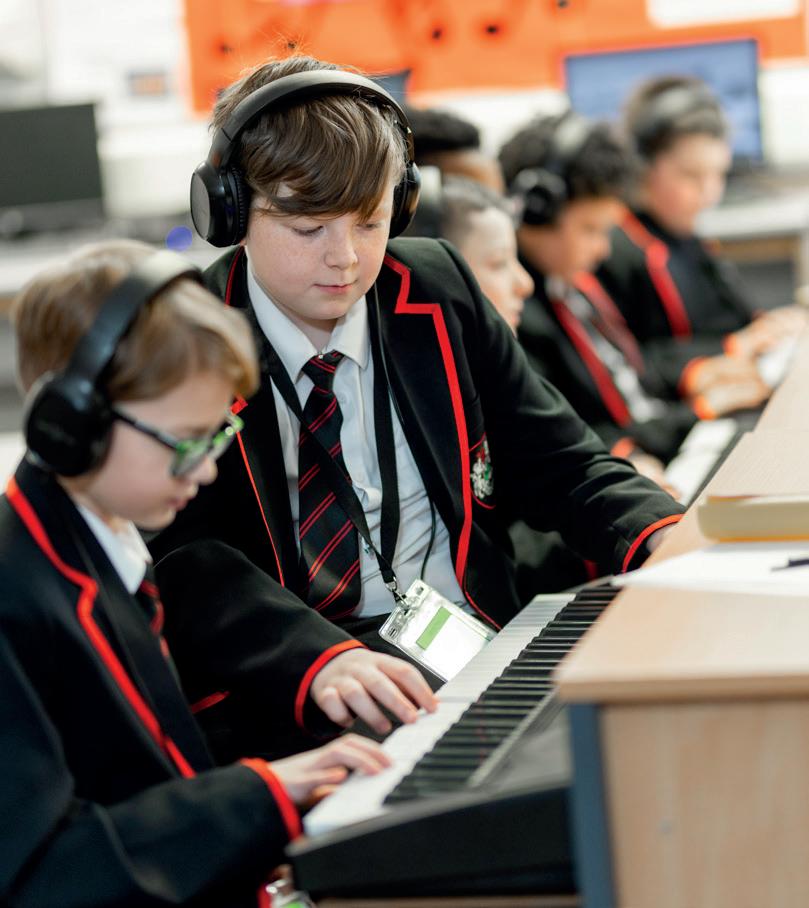
The Music qualification is equivalent to 1 GCSE and taught over two years. It has two units that are completed as a portfolio of assignments. The third unit is an examined unit of work, the brief is released by the exam board in January of Year 11. Students will respond to the brief by creating a piece of work to be used commercially. They will use the skills they have learnt in the first two units to create this music.
Students will need to learn to read music and general aspects of music theory. Performance skills would be an advantage when studying the course but not essential.
Assessment
Component 1 : Design & Technology in the 21st Century
Written Exam : 2 hours
50% of qualification
Component 2 : Design & Make Task
Non-exam assesment : approx. 35 hours
50% of qualification
What topics are covered during the course?
You will Study:
• Technical Principles
• Designing and making principles
This will allow you to develop knowledge and understanding of design and technology, its impact on daily life, and develop a broad understanding of materials, systems and processes.
What skills will I develop?
Studying Design and Technology will enable you to develop a wide range of transferable skills for further education, work and life:
• Creative and innovative thinking
• Use of imagination and experimentation
• Ability to critique and refine your own ideas
• Knowledge and understanding of all design and technological activity and influences
• Decision making skills
• Develop high quality, imaginative and functional prototypes
• Communication skills
After GCSEs:
Foundation/BTEC/ Degree level in Design and Technology
What careers are linked to this course?
There are many career paths that Design and Technology could take you down; from Carpenter to Architect all the way to Aerospace engineer. Here are just some of the industries and jobs that are facilitated by a qualification in Design and Technology:
• ART AND DESIGN - Graphic Designer, Sculptor, Gallery Curator
• IT AND THE INTERNET - Games Developer, Software, Programmer, Network Engineer, Web Designer
• FAST CONSUMER GOODS - Mechanical Engineer, Product Designer, Market Researcher
• FASHION AND BEAUTY - Fashion Designer, Dressmaker, Hairdresser
• CONSTRUCTION – Tradesperson, Architect, Construction Manager
• MANUFACTURING – Food Technologist, Manufacturing Engineer, Manufacturing Manager
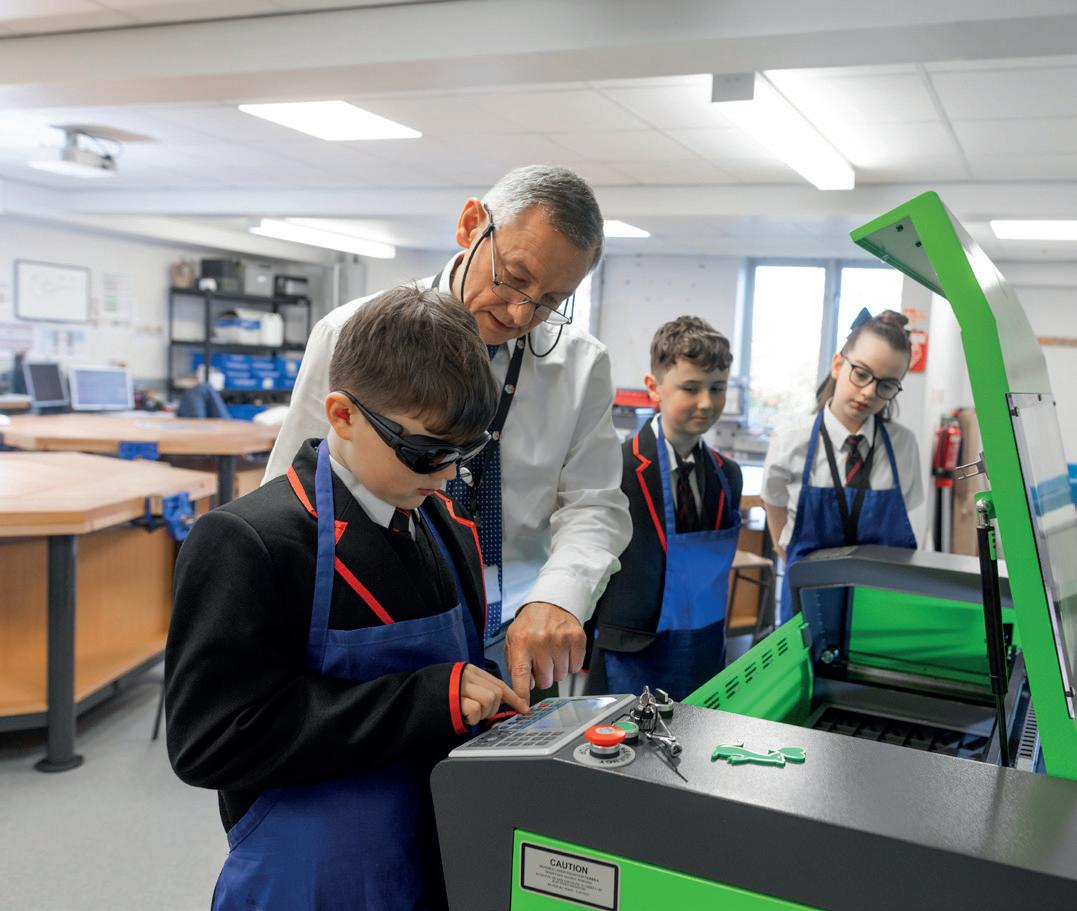
Assessment
2 x 1 hr 45 mins examinations (100% combined)
What topics are covered during the course?
Award: Equivalent to one GCSE (120 credits)
Component 1: The study of religions: beliefs, teachings and practices:
Students will be aware that Christianity and Islam are two of the most diverse religious traditions and beliefs in Great Britain today. Students will study the influence of the beliefs, teachings and practices studied on individuals, communities and societies.
Christianity:
• Key beliefs including the nature of God and differing beliefs regarding creation.
• Key practices including worship, festivals and roles in the community.
Islam:
• Key beliefs including Sunni and Shi’a Islam, the role and importance of Muhammad and beliefs regarding the afterlife.
• Key practices including prayer, duties and the importance of celebrating festivals.
Component 2: Thematic studies:
Students will also study philosophical and ethical arguments related to issues such as abortion, capital punishment and sex before marriage, and their impact on the modern world. Students will show their understanding of religion through the application of teachings from religion and beliefs.
Theme A: Relationships and families
Students will explore the following topics: Contraception and family planning, sex before marriage, cohabitation and marriage and divorce.
Theme B: Religion and life
Students will explore the following topics: When does life begin, abortion, euthanasisa, animal experimentation and look at different beliefs about how life began.
Theme E: Religion, crime and punishment
Students will explore the following topics: Corporal punishment, death penalty, forgiveness and the origins of evil and suffering.
Theme F: Religion, social justice and human rights
Students will explore the following topics: Prejudice, discrimination and inequality with reference to wealth, race, gender and religion.
• Students will also gain an appreciation of how religion, philosophy and ethics form the basis of our culture.
• They will develop analytical and critical thinking skills, the ability to work with abstract ideas, leadership and research skills. All these skills will help to prepare them for further study,
After GCSEs:
A Level/BTEC qualifications in Ethics and Philosophy, Religious Studies, Politics, Theology and Law.
Universities:
University courses in Ethics and Philosophy, Law, Politics.
What careers are linked to this course?
Lawyer, solicitor, politician, teacher, journalist, public speakerm writer, activist.
Two centre assessed portfolio tasks to be completed in Year 10.
One externally assessed written exam to be completed in Year 11.
What topics are covered during the course?
Award: Equivalent to one GCSE (120 credits)
R184: Contemporary issues in sport (Assessed Externally Exam)
R185: Performance and leadership in sports activities (Centre Assessed Tasks)
R187: Increasing awareness of Outdoor and Adventurous Activities (Centre Assessed Tasks)
There will be a compulsory practical session for all students.
• The Sport studies course is designed to develop the skills of team working, research and planning and understand that sports performance goes far beyond just the simple physical activity of sport. Students will understand topical and contemporary issues in sport, including; why people do and do not participate in sport, the promotion of ethics and values, the roles of National Governing Bodies and high profile events have in sport, as well as how technology is used within sport they will also engage in in outdoor and adventurous activities in natural settings, learning how to do this safely as well as understanding the benefits these activities offer.
• Practical skills in a range of sports such as;Badminton, Basketball, Fitness, Handball,Football, Netball, Tennis and more.
Level: Cambridge Nationals
Level 1/2 (Equivalent to 1 GCSE 120 credits)
Exam Board: OCR
Study of the qualification as part of Key Stage 4 learning will help learners to make more informed choices for further learning either generally or in this sector.
Learners who generally achieve at Level 2 across their Key Stage 4 learning might consider progression to:
• A Levels as preparation for entry into higher education in a range of subjects
• Study of a vocational qualification at Level 3, such as a OCR Cambridge National
Level 3 in Sport and Physical Activity or BTEC National Level 3 in Sports Exercise and Science, which prepares to enter employment or apprenticeships, or to move on to higher education by studying a degree in the sports studies and sports science areas.
Learners who generally achieve at Level 1 across their Key Stage 4 learning might consider progression to:
• Study at Level 2 post-16 in a range of technical routes designed to lead to; progression to employment, apprenticeships or to further study at Level 2 then 3.
• Study of sports post-16 through a technical certificate. Learners who perform strongly in this qualification compared to their overall performance should strongly consider this progression route as it can lead to employment in the sports sector.
What careers are linked to this course?
Teaching, Coaching, Physiotherapy, Fitness trainer, careers in sport.
Practical lessons are compulsory as part of this course and full PE kit is expected for every practical lesson.
Assessment
2 x 1 hour 30 minute Calculator Papers
What topics are covered during the course?
Students will be exposed to all stages of the statistical cycle. The Collection of data which includes: know and apply terms used to describe different types of data that can be collected for statistical analysis, know the difference between population, know that data can be collected from different sources: experimental, simulation, questionnaires, observation, reference, census, population and sampling.
Processing, representing and analysing data which includes: tabulation, diagrams and representation, measures of central tendency, measures of dispersion, scatter diagrams and correlation, time series, quality assurance, estimation
Probability which includes: use collected data to calculate estimates of probabilities, experimental probability, theoretical probability, bias, two way tables, sample space diagrams, tree diagrams, Venn diagrams, notation, binomial distribution, normal distribution, standard deviation.
What skills will I develop?
The curriculum is designed so students are introduced to the skills of statistical enquiry, and practise the underpinning statistical calculations and interpretation using real world data and authentic contexts.
• Cognitive skills
• Problem solving
• Critical thinking
• ICT literacy
• Communication
• Relationship-building skills
• Collaborative problem solving
• Adaptability
• Self-management and self-development
Students will be able to:
• Understand the importance of initial planning
• Recognise the constraints involved in sourcing appropriate data
• Understand ways that data can be processed and presented
• Understand that results must be interpreted with reference to the context of the problem
• Show an understanding of the importance of clear and concise communication of findings and key ideas, and an awareness of target audience, additionally understand the importance of evaluating all statistical work
After GCSEs:
GCSE Statistics will support students in an application to A Level courses such as Maths, Science, Business and statistics.
Universities:
GCSE Statistics supports the study of the Statistics element of A Level Mathematics and Core Mathematics. It will also support any other course that involves the analysis of data such as Biology, Economics, Psychology, Geography and PE.
What careers are linked to this course?
Careers using Statistics are wide and varied: Data Analyst, Actuarial Scientist, Financial Manager, Chartered Accountant, Economist, Civil Servant to name a few.
Additional information
This GCSE is open to all students, and if you are enthusiastic about maths, we strongly recommend this GCSE.